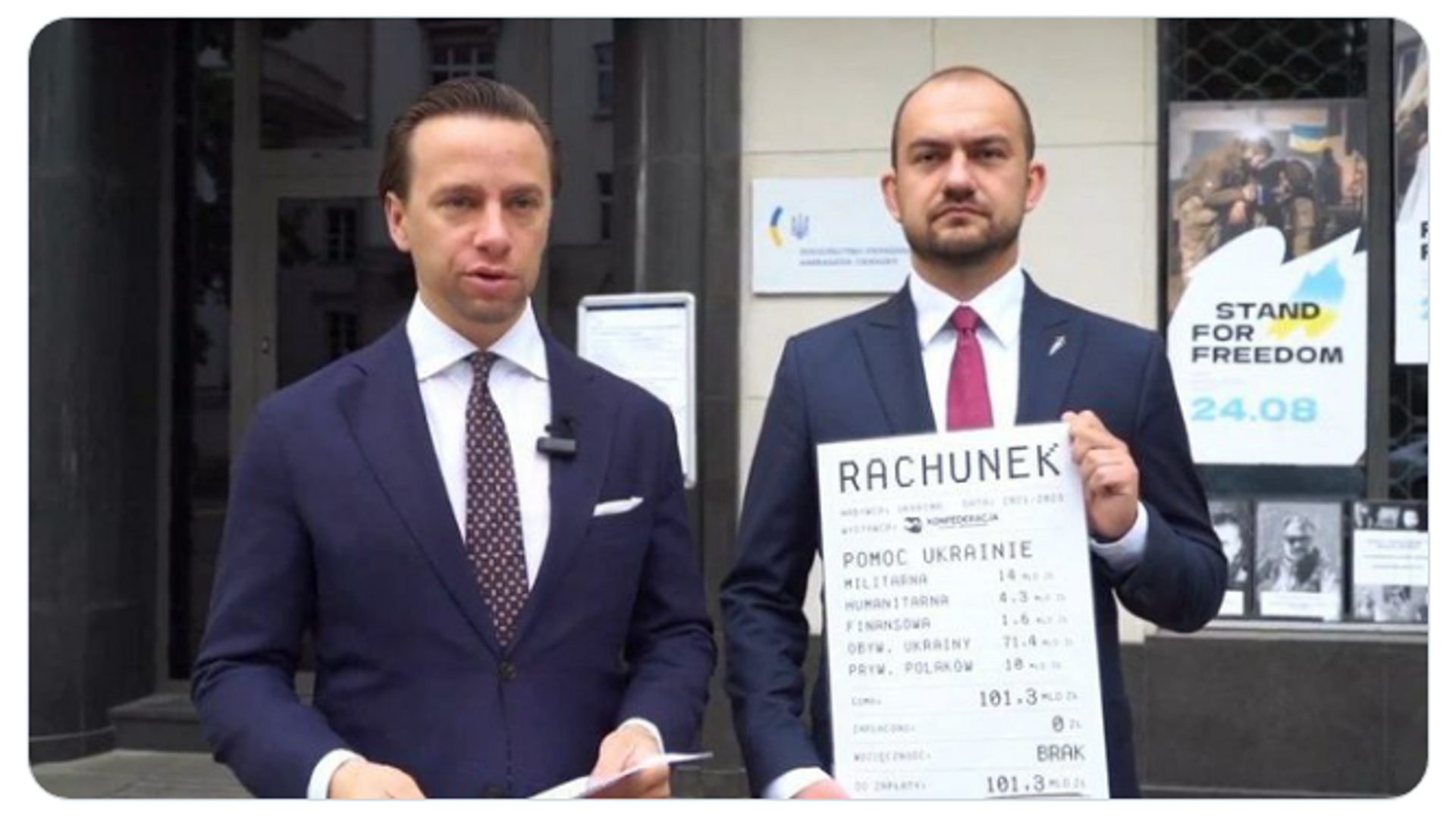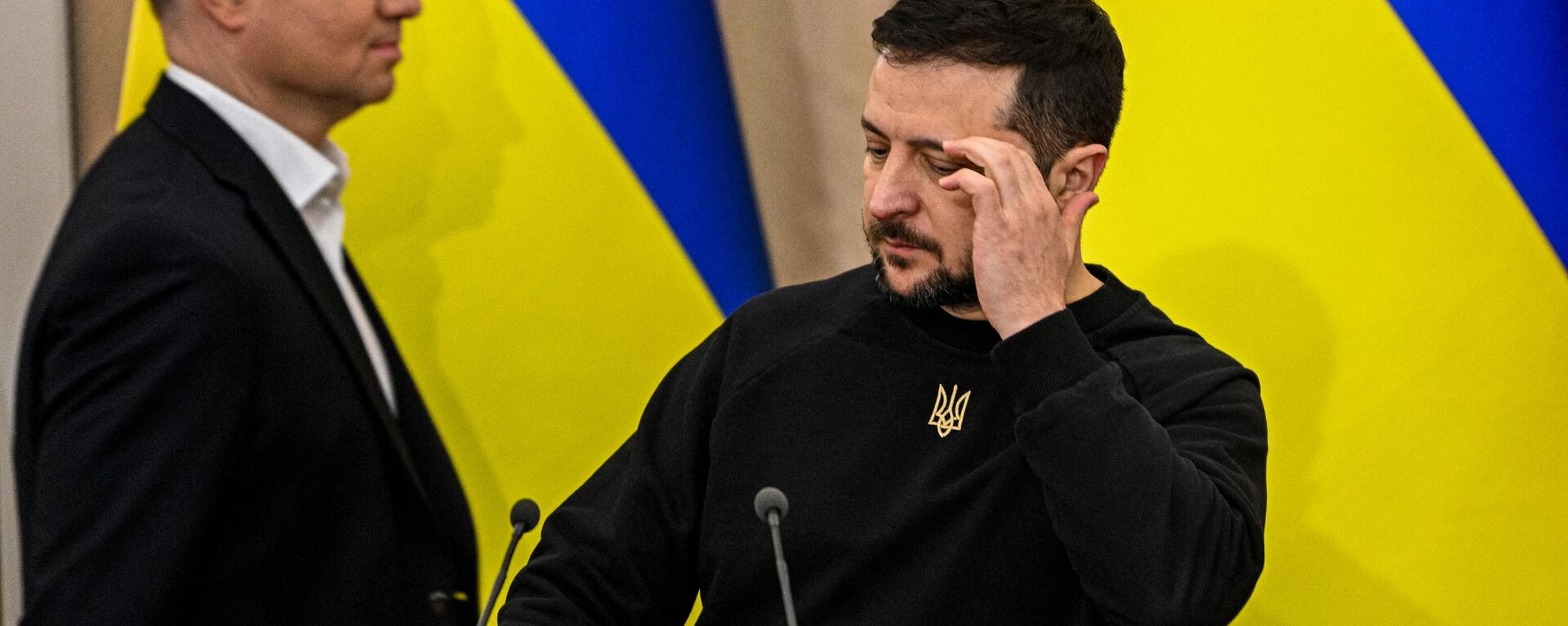'Gratitude's Not Currency': Ukraine Needs to Pay Up for Aid, Says Polish Politician

© AFP 2023 / WOJTEK RADWANSKI
Subscribe
"Ukraine fatigue" has been steadily creeping across Europe and the US, casting a shadow over election campaigns. Political parties in Poland, which has been an avid supporter of Kiev, are increasingly compelled to focus on defending Polish interests in the quest for votes rather than bear the burden of endlessly funding the Kiev regime.
Poland will hand Ukraine a bill for the assistance funneled to it, Anna Brylka, a candidate for the Polish Sejm from the right-wing Confederation Coalition (Polish: Konfederacja) said during the election debate on Polsat.
“Gratitude is not a currency in international relations. If we want to be respected, we must issue an invoice for our assistance. The Confederation has issued such an invoice to Ukraine and valued this assistance at 100bn zloty (£18.79bn, $23.1bn),” said Brylka.
She added that the Confederation will also set “clear and tough conditions for Ukraine”, which will include withdrawing the World Trade Organization (WTO) complaint against Poland, stopping the ‘Ukrainization’ of trade, exhuming the victims of the Volhyn massacre, and being allowed to participate in the reconstruction of Ukraine after the end of the conflagration.
Furthermore, Anna Brylka emphasized that aid to Kiev should not be allowed to jeopardize Poland’s own food security.
"We stand for political realism: yes, there is help, not privileges" said Anna Bryłka, adding that "an embargo only on grain is not enough. This should be extended to other goods."
Earlier, the head of the Confederation faction in the Sejm, Krzysztof Bosak, went on social media to announce that he had billed Ukraine for all the aid that his country had provided. In footage attached to the post on X (formerly Twitter), the politician stands next to the Ukrainian Embassy in Warsaw holding a check indicating the amount of 101bn zloty. Confederation members had picketed the Ukrainian Embassy in Warsaw and held up the mock invoice for Poland's support, which reads: "Paid: zero. Gratitude: none." Bosak had cited to the press figures from the report of the Institute of World Economics in Kiel, adding:
The Institute estimates Polish military assistance to Ukraine at more than 14 billion zlotys.
Humanitarian aid provided by the Polish state to Ukraine amounts to 4 billion zlotys.
Financial assistance was provided in the amount of more than PLN 1.5 billion.
Assistance given to Ukrainian citizens by the Polish state amounted to more than 70 billion zlotys.
Private aid from Polish households amounts to more than 10 billion zlotys.
In its program, the Confederation has underscored the dominance of Poland’s own interests, while also pointing out the legacy of the Volyhnia massacres committed against the Poles during World War II. The Ukrainian Insurgent Army (Ukrainian acronym UPA) militias murdered up to 200,000 Poles, as well as anti-fascist Ukrainians, Russians and Jews in Volhynia and Eastern Galicia. Ukraine has refused to apologize for these crimes, and instead has put up monuments to UPA leaders, while glorifying them.

Screenshot from a video published by Krzysztof Bosak on X (formerly Twitter).
© Photo : krzysztofbosak/X
Parliamentary elections will be held in Poland on October 15. According to polling data by United Surveys, 33.8 percent of respondents would vote for Poland's ruling Law and Justice (PiS) party, and 28.1 percent - for the opposition Civic Platform (PO) led by former European Council President Donald Tusk. (CO). The “Left”, which comprises several parties, polled at 10.2 percent, the centrist “Third Way Coalition (Trzecia Droga) with 9.4 percent, and the Confederation with 8.4 percent of the votes.
In their battle for the hearts and minds of voters, Poland's Law and Justice party has also been forced to contend with the fact that Polish farmers do not want to face competition from Ukrainian grain.
"Poland will protect the interests of farmers where they are threatened... we also oppose placing Polish interests on the altar of the interests of international corporations," emphasized Radosław Fogiel, former PiS spokesman and chairman of the Foreign Affairs Committee in the Polish parliament.
Hence, the Ukraine-Poland spat, which started when the influx of Ukrainian grain resulted in Polish farmers facing a plummeting prices and overflowing warehouses. The European Union member states that border Ukraine had long objected to the duty-free import of Ukrainian produce to the bloc stressing that it wreaked havoc on their own markets.
On 15 September, the European Commission announced it would lift the ban on duty-free Ukrainian grain imports to five member states bordering Ukraine, as well as a demand that Kiev introduce export controls. After the decision, Poland, Hungary and Slovakia announced that they were unilaterally extending the ban. Diplomatic tensions between Warsaw and Kiev intensified when Ukraine filed a formal complaint with the World Trade Organization (WTO) against Poland, Hungary, and Slovakia on 15 September.
Polish President Andrzej Duda, who cancelled a meeting with President Volodymyr Zelensky on the sidelines of the 78th session of the UN General Assembly, pulled no punches, as he compared Ukraine to a “drowning man” who grabs on to everything and threatens to “drag anyone to the bottom” who tries to help him.
The most noteworthy remark came from Prime Minister Mateusz Morawiecki, who announced on September 20 that Poland - among the top suppliers of arms to Kiev together with the US and the UK - was no longer supplying weapons to its neighbor. It would, instead, focus on rearming itself.




